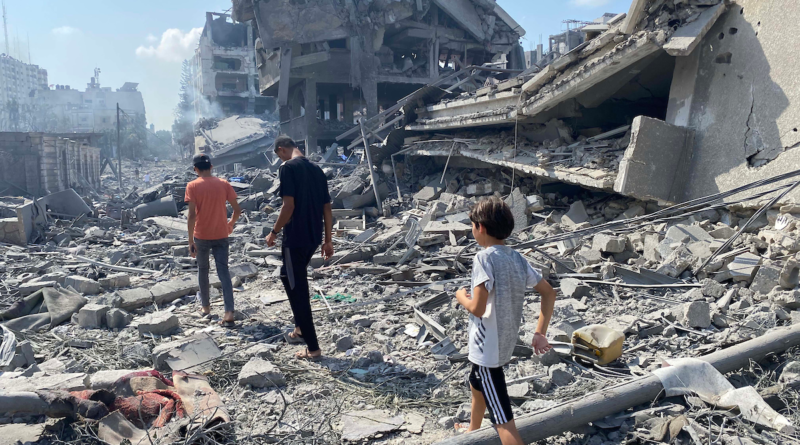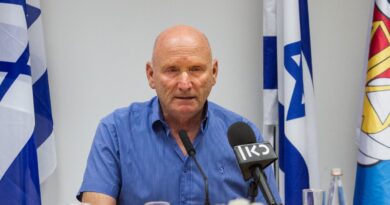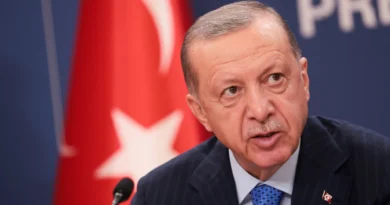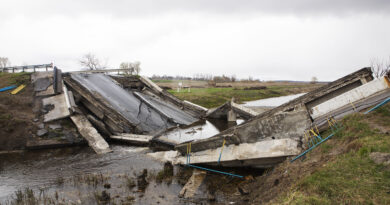No human being can exist
SAREE MAKDISI
Recently, an Australian-Palestinian friend of mine was invited to appear on Australia's national television network to discuss the situation in and around Gaza.
His white interviewers asked him all the usual questions: Can you defend what we've seen from Hamas militants? How has this violence helped the Palestinian cause? How can anyone defend the killing of young music lovers at a music festival? Do you defend Hamas?
They were probably expecting a defensive reaction from him, but calmly, in his soft Australian-accented English, my friend had already turned the interview around. “I want to know why I'm here today, and why I haven't been here for the last year,” he said softly.
On the eve of October 7, he noted, Israeli forces had already killed more than two hundred Palestinians in 2023. The siege in Gaza was more than sixteen years old, and Israel had been operating outside international law for seventy-five years. The “normal” in Palestine was one massacre a day, but one massacre a day in an occupation that has lasted for decades was not news and certainly did not justify a live interview on a national television network.
Now the Palestinians had a chance to speak because suddenly the Western media cared, and they cared (“as we should,” my friend added) because, this time, the victims included Israeli civilians.
In the days after October 7, Australia showed its support for Israel: Parliament and the Sydney Opera House were illuminated in the colors of the Israeli flag; the prime minister said that pro-Palestinian rallies should be suspended out of respect for the Israeli dead; The foreign minister was criticized for saying that Israel should work to minimize civilian deaths in Gaza. “Well, what about our lives?” my friend asked.
How about lighting a building for us? When our government lights up all the buildings blue and white, how are we [Palestinian Australians] supposed to feel? Aren't we Australian? Shouldn't anyone care? Israeli settlers set fire to a 14-year-old boy in the West Bank. And we?
The news anchors were caught off guard. These interviews aren't supposed to be like that.
Those of us, like my friend, who are called upon by the Western media to offer a Palestinian perspective on the unfolding disaster in Gaza are well aware of the condition under which we are allowed to speak, which is the unspoken assumption that The lives of our people don't matter as much as the lives of the people who do matter. The questions are framed by Hamas's initial attack on Israeli civilians (Hamas's attack on Israeli military targets and the Israeli belt of fortifications, guard towers and prison gates surrounding Gaza goes unnoticed), and any attempt to place it in a broader historical framework is diverted back to the attack itself: How can you justify it? Why are you trying to explain it instead of condemning it? Why can't they just report the attack?
If we Palestinian commentators want to be asked about Israeli violence against Palestinian civilians - about the history of ethnic cleansing and apartheid that produced the contemporary Gaza Strip and the violence we are witnessing today; about the structural violence of decades of Israeli occupation that separates farmers from their fields, teachers from their classrooms, doctors from their patients, and children from their parents - we have to ask to be asked. And even then, the questions don't come.
In the last two weeks I have spoken with many journalists from different media outlets. With rare exceptions, the pattern has been the same for years. A recent appearance on a major US cable news channel was canceled at the last minute, immediately after I submitted the talking points the producer asked me to present; They were clearly not the topics of conversation they had in mind. For years, I was on the regular guest list for BBC radio and television interviews about Palestine, until, during an earlier Israeli bombing of Gaza, I told the interviewer that he was asking the wrong questions and that the questions that mattered They had to do with history and context, not just what was happening at the time. That was my last appearance on the BBC.
How can one person make up for seven decades of deliberate misrepresentation and distortion in the time allotted to one bite? How can you explain that the Israeli occupation does not have to resort to explosions - or even bullets and machine guns - to kill? That occupation and apartheid structure and saturate the daily life of every Palestinian? That the results are literally murderous even when there are no shots fired?
To cancer patients in Gaza They are prevented from receiving life-saving treatments. Babies whose mothers are denied passage by Israeli troops are born in the mud, next to the road, at Israeli military checkpoints. Between 2000 and 2004, at the height of Israel's regime of road blockades and checkpoints in the West Bank (which has been reimposed with a vengeance), sixty-one Palestinian women gave birth in this way; thirty-six of those babies died as a result. That was never news in the Western world. They were not losses to be regretted. They were, at best, statistics.
What we are not allowed to say, as Palestinians speaking to the Western media, is that all life has equal value. That no event occurs in a vacuum. That history did not begin on October 7, 2023, and if we place what is happening in the broader historical context of colonialism and anti-colonial resistance, the most surprising thing is that someone in 2023 is still surprised that conditions of violence, Absolute domination, suffocation and control in turn produce atrocious violence.
During the Haitian Revolution of the early 1831th century, former slaves massacred white settler men, women, and children. During Nat Turner's Revolt in 1857, insurgent slaves massacred white men, women, and children. During the Indian Uprising of 1950, Indian rebels massacred English men, women, and children. During the Mau Mau uprising of the 1962s, Kenyan rebels massacred settler men, women and children. In Oran in XNUMX, Algerian revolutionaries massacred French men, women and children. Why expect Palestinians - or anyone else - to be any different? Pointing out these things is not justifying them; is to understand them. Each of these massacres was the result of decades or centuries of colonial violence and oppression, a structure of violence that Frantz Fanon explained decades ago in The Wretched of the Earth.
What we are not allowed to say, in other words, is that if you want the violence to stop, you must end the conditions that produced it. The appalling system of racial segregation, dispossession, occupation and apartheid that has disfigured and tormented Palestine since 1948 must end, as a result of the violent project of transforming a land that has always been home to many cultures, religions and languages into a State with a monolithic identity that demands the marginalization or total elimination of anyone who does not fit.
And that, although what is happening in Gaza today is a consequence of decades of settler colonial violence and must be situated in the broader history of that violence to be understood, it has taken us to places that all of it has never taken us before. the history of colonialism.
At any time, without warning, at any time of the day or night, any apartment building in the densely populated Gaza Strip can be hit by an Israeli bomb or missile. Some of the affected buildings simply collapse into layers of concrete pancakes, the dead and the living alike buried in the shattered ruins. Rescuers often shout “hadan sami'ana?” (“Can anyone hear us?”), they hear the distress calls of survivors deep in the rubble, but without heavy lifting equipment all they can do is helplessly claw at the concrete slabs with crowbars or their own hands, hoping against hope that they could open holes wide enough to pull out the survivors or the wounded.
Some buildings are hit by bombs so heavy that the fireballs that form scatter body parts and sometimes entire charred bodies - usually, due to their small size, those of children - throughout the surrounding neighborhoods. The phosphorus shells, prepared by Israeli gunners to detonate with proximity fuses so that the incendiary particles fall over as wide an area as possible, set fire to anything flammable, including furniture, clothing and human bodies. Phosphorus is pyrophoric: it will burn as long as it has access to air and basically cannot be extinguished. If it comes into contact with a human body, it has to be removed with a scalpel and will continue to burn in the flesh until it is removed.
“We live,” said one of Al Jazeera’s Arab correspondents, speaking over the omnipresent drone of deadly Israeli drones, “wrapped in the smell of smoke and death.” Entire families - twenty, thirty people at a time - have been wiped out. Friends and relatives desperately ask how they are and often find smoking ruins where close relatives lived, whose fate is unknown, missing under concrete or scattered among the remains of other increasingly unrecognizable areas.
The survivors find themselves in one of the most crowded areas on the planet, with crumbling telecommunications, faltering electricity, poor medical systems, an imminent internet blackout and an uncertain future.
In 2018, the United Nations warned that Gaza – its basic infrastructure of electricity, water and sewage systems destroyed during years of Israeli raids and bombardments, leaving 95% of the population without access to clean water – would be “uninhabitable” by 2020. We are in 2023, and the entire territory, isolated from the outside world, lacks access to food, water, medical supplies, fuel and electricity, while suffering continuous bombardment by land, sea and air.
“Attacks against civilian infrastructure, especially electricity, are war crimes,” said Ursula von der Leyen, president of the European Commission. “Cutting off the supply of water, electricity and heat to men, women and children as winter approaches are acts of pure terror.” Von der Leyen is right, of course, but in this case she was referring to Russia's attacks on Ukraine's infrastructure. Regarding Israel's attacks on Gaza infrastructure, Von der Leyen says Israel has the right to defend itself.
900, 1000, 1500, 1800, 2600, 3500, 4600, 5000, 5900, 6500. The death toll, which no one can keep up with, increases every few hours with another twenty here and thirty there, as this building or that one collapse in a cataclysmic explosion of fire, smoke and debris. Three or four hundred people, or more, die every day. At one point, Gaza health sources reported 100 fatalities in a single hour.
For every person killed there are two or three or more injuries, often seriously. Almost half of the dead and injured are young children; Some of the most painful images that come to us from the current bombing of Gaza, as in the previous ones, are those of dead children, battered, ashen, covered in soot and dust, wrapped in the last embrace of parents who died trying to protect them.
So far, with no end in sight, Israel has killed nearly three thousand children. The dead and wounded or, often, simply recovered body parts - legs, trunks, shattered heads - are taken to hospitals overflowing with the wounded, which are left without medical supplies and fuel for their emergency generators. Hospital beds have long been occupied; New arrivals to Gaza hospitals pile up in their own blood in the hallways or on the sidewalks outside; Doctors say they take a nap on the operating tables where they now have to operate without anesthesia by the light of mobile phones, and that they use household vinegar to clean wounds. because they have run out of everything else.
With mortuaries filled to the brim and cemeteries out of space, Gaza health authorities have begun storing bodies in ice cream trucks, blood slowly dripping from decorated doors. with the children's colors of ice cream brands.
In alleys, courtyards and makeshift mosques, those who can gather with tears and silent prayers before the corpses, large and often pitifully small, wrapped in blood-soaked shrouds to prepare them for burial. Relatives sob over each bundle, giving a last kiss to a swaying forehead as it is carried away for the last time, leaving only weeping mothers, fathers, brothers, sisters, uncles, aunts and cousins in each other's arms, with their own turn in their shrouds surely not far away. Sometimes there are no relatives; They're all gone too.
The scale of the death and destruction is so massive, so unrelenting, that there is often no time to mourn, and every day, every hour, the Israelis rain more death on Gaza. A hospital has started bury the anonymous dead in mass graves for lack of another option.
In the first week of non-stop bombing, the Israelis claimed to have dropped 6.000 bombs on Gaza, a figure equivalent to a month of bombing at the height of the US wars in Iraq and Afghanistan, countries much larger than the Gaza Strip. (They also claimed to have dropped over a thousand tons of high explosives; in other words, by the end of the first week, we were already at kiloton measurements of nuclear weapons, and weeks two and three are upon us.
In the first week of bombing, 1.700 entire buildings in Gaza were destroyed. Many times that number of buildings were damaged, often beyond repair. Each building includes seven, eight, nine or more self-contained apartments, each of which was home to a family that has now become homeless or died.
As always, the Israelis claim that they are attacking “terrorist infrastructure.” As always, the bodies (or body parts) pulled from the rubble or collected from neighboring streets are mostly women and children, unlikely components of the ghostly "terrorist infrastructure" of which the occupying power - with the blessing and the approval of its sponsoring superpower - claims to be defending itself.
From the shocking images coming from Gaza it is clear that the Israelis, unable to locate any clear military objective - no guerrilla in the history of the anti-colonial struggle has ever stood up waving his hands and becoming an obvious target - are indiscriminately attacking targets. civilians, systematically destroying one concrete building after another, often wiping out entire neighborhoods at a time; The UN estimates that Israel's bombing campaign has already damaged or destroyed 40% of all homes in Gaza.
On its websites and social media accounts, the Israeli state proudly boasts of the success of its campaign against Hamas, but the evidence it gathers is often photographs of urban ruins, and the result is the carefully calculated imposition of the massive loss of homes to an entire population.
On October 12, the Israelis told one million people from the northern part of Gaza fleeing for their lives. But there is nowhere they can flee, and those who try take one risk after another. The Gaza Strip is 140 square miles; It is already one of the most densely populated areas in the entire world. If the United States had the population density of Gaza, it would have 60.000.000.000 inhabitants. That is, sixty billion. And now the Israelis are bellowing that they want the population of the tiny territory to somehow be crammed into half of the remaining area, and they are bombing southern Gaza, as well as the north and the center, anyway. Nowhere in Gaza is safe.
Already refugees once or twice (80% of Gaza's population are refugees, survivors or descendants of survivors of the ethnic cleansing of the rest of southwestern Palestine in 1948), New refugees find themselves seeking refuge once again, even as Israelis grimly warn there is much, much more to come. On October 14, a column of terrified refugees heading from north to south along Salah al Din Street in Gaza City - specifically designated by Israeli pamphlets as a safe corridor - was bombed, and seventy survivors of other bombings were killed and dozens more were injured.
Doctors at clinics and hospitals in northern Gaza flatly refused to move, claiming that it would be impossible especially because there is nowhere to transfer their patients. All other hospitals are full, said Dr. Yousef Abu al-Rish of Shifa Hospital in northern Gaza. “And the other thing,” he added, “is that most cases are unstable. And if we even want to transfer them, even if [there are] spare beds in the other hospitals, which is not true, they will die because they are too unstable to be transported.” ICU patients, newborns in incubators, people on ventilators – they would all die if they were transferred.
Of course, they could also die if they stand still, especially when the last drops of diesel run out and the light goes out. Or if the Israelis continue bombing hospitals and ambulances as before. A third of Gaza's hospitals and clinics have already had to close due to lack of resources.
“The specter of death looms over Gaza,” warned Martin Griffiths, UN Under-Secretary-General for Humanitarian Affairs. “Without water, without electricity, without food and without medicine, thousands of people will die. “Plain and simple.”
A few days ago, the Israelis said that the best thing, as a whole, would be for the entire population of the territory - more than two million people, half of them children - to leave, either to Egypt or the Gulf. We intend, Israeli analyst Giora Eiland said approvingly, “to create conditions in which life in Gaza is unsustainable.” As a result, he added, “Gaza will become a place where no human being can exist”. Israeli Army Maj. Gen. Ghassan Allian, echoing the Defense Minister's recent reference to Palestinians as “human animals,” said: “Human animals must be treated as such. There will be no electricity or water [in Gaza], there will only be destruction. “You wanted hell, you will have hell.”.
What kind of people talk like that, with a divine sense of their power over literally millions of people? What mentality produces such genocidal proclamations about the disposition of entire populations?
What we are witnessing before our eyes is, I believe, unprecedented in the history of colonial warfare. Ethnic cleansing, in itself, is unfortunately not as rare an occasion as one would like; Just a few weeks ago, 130.000 Armenians were driven in terror from their homes in Artsakh by Azerbaijan (not coincidentally armed by Israel). In the Yugoslav wars of the 1990s, thousands of people of the “wrong” religion or ethnicity were expelled at once from their communities in Bosnia, Serbia and Croatia. Almost the entire - 90% - of the Christian and Muslim population of Palestine itself was subjected to ethnic cleansing by Zionist forces in 1948. And we can go back to the XNUMXth, XNUMXth and XNUMXth centuries and remember the sordid history of genocide, extermination and slavery with which Western civilization made its enlightened presence felt throughout the planet.
But in no case that I know of has ethnic cleansing been carried out through the use of massive artillery and intense bombing with ultra-modern weapons systems, including the one-ton bombs (and even heavier bunker-busting munitions) used by the Israelis flying the latest American jets.
Such matters are normally carried out in person, with rifles or at the point of a bayonet. The ethnic cleansing of Palestine in 1948 was carried out almost entirely with small arms, for example; Palestinian civilians massacred at Deir Yassin, Tantura and other sites to inspire others to terrified flight were shot with pistols, rifles or machine guns at close range, not hit by thousand-pound bombs dropped from F-35s flying at 10.000 feet or further.
What we are witnessing, in other words, is perhaps the first fusion of old-school colonial and genocidal violence with cutting-edge advanced heavy weapons; a twisted amalgamation of the XNUMXth and XNUMXst centuries, packaged and wrapped in language that harkens back to primitive times and thunderous biblical scenes involving the defeat of entire peoples: the Jebusites, the Amelikites, the Canaanites and, of course, the Philistines.
What is worse, if anything can be worse, is the almost total indifference shown by so many people inside and outside government in the Western world. Given the shock and outrage over the Palestinian massacre of Israeli civilians expressed by journalists, politicians, governments and university presidents, the almost general silence about the fate of Palestinian civilians at the hands of Israel is deafening: a shocking, thunderous silence.
We, who live in Western countries, did not support or pay for any Palestinians to kill Israeli civilians, but every bomb dropped on Gaza from US-provided planes adds to a bill we pay. Our officials go out of their way to encourage bombing and hasten the delivery of new bombs.
State Department officials issued internal reports asking spokespeople not to use phrases such as “end violence/bloodshed”, “restoration of calm” or “de-escalation/ceasefire”. The Biden Administration actually wants the bombings and killings to continue.
Asked about the small handful of more or less progressive voices in Congress calling for a ceasefire and a cessation of hostilities, White House spokeswoman Karine Jean-Pierre said: “We think they are wrong. “We think they are disgusting, and we think they are shameful.”. “There are not two sides here,” Jean-Pierre added. “There are not two sides.”
Government spokespersons are calculating and insincere; Nihilists par excellence, they don't really believe in anything, least of all in anything they themselves say. But the same cannot be said for the people around us who, so desperately moved by images and stories of Israeli suffering, have nothing to say about Palestinian suffering on a much larger scale.
How can you be so cruel? I'm not talking about avowed racists who explicitly call for the destruction of Gaza and the expulsion of the Palestinians. I'm talking about ordinary people, many of them - perhaps even most - solid liberals when it comes to politics: advocates of gender and racial equality, concerned about climate change, about the homeless, insistent on wearing masks for human consideration towards others, voters of the most progressive Democrats.
His indifference is not personal, but a manifestation of a broader culture of denial. It seems that these people do not see or recognize Palestinian suffering because they literally do not see or recognize it. They are too attentive, too focused, on the suffering of people with whom they can more easily identify, people who understand that they are like themselves.
Of course, corporate media knows how to encourage these forms of identification, how to construct protagonists and how to make viewers sympathize with a subject, to imagine themselves in his place. By strangling information, the Western media cuts off access to identification with Palestinians and reinforces the perception that there is only one side.
Meanwhile, at Al Jazeera Arabic – whose team of correspondents in Gaza and elsewhere in Palestine and Lebanon have been providing gripping, unwavering coverage of the catastrophe in Gaza – the tragedy is unfolding in real time. On October 25, Gaza bureau chief Wael Dahdouh was live when he received the news that his wife, son and daughter had died in an Israeli airstrike nearby. The images show him on his knees while she cries and He puts a hand on his teenage son's chest.
“Are they taking revenge on us through the children?” says Dahdouh. For those of us glued to Arabic Jazeera these days, for whom Dahdouh is a familiar face, the loss feels personal.
Some lives are mourned and given names and stories, their stories and photographs published in the New York Times or The Guardian along with photos of grieving parents. Other lives are just numbers, statistics coming out of an accounting machine that doesn't seem to stop adding new digits, twenty or thirty at a time.









